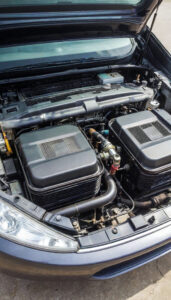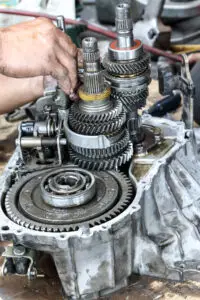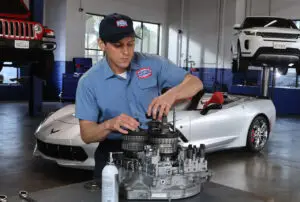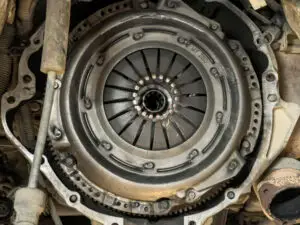The Air Feels Warm or Muggy
 When your car’s AC is turned on, air coming from the vents should feel cool and crisp. The role of the air conditioning system is to remove humidity and chill warm air from the environment before sending it into the passenger cabin. If instead it feels warm or muggy, it indicates a problem with the system.
When your car’s AC is turned on, air coming from the vents should feel cool and crisp. The role of the air conditioning system is to remove humidity and chill warm air from the environment before sending it into the passenger cabin. If instead it feels warm or muggy, it indicates a problem with the system.
Your Car’s AC System Needs a Recharge
Over time, you may need to have your car’s AC recharged, though it shouldn’t be necessary very often. This service involves refilling refrigerant to the proper level so that air is chilled before flowing into the passenger cabin. While it sounds simple enough, an AC recharge requires specific tools and precision, so it’s best done by a professional mechanic. Both over- and under-filling refrigerant can cause warm air and other issues with your car’s air conditioning. If your car often needs an AC recharge, there may also be a leak in the system that needs to be located and sealed.
The Condenser or Compressor is Malfunctioning
As refrigerant flows through the AC system, it’s turned into gas by the compressor and then chilled by the condenser. If either of these components is malfunctioning, whether damaged or dirty, refrigerant may not properly cool air before it’s sent into the passenger cabin. The issue may be as simple as a faulty relay or switch — or it may involve more complex repairs to the condenser or compressor. Diagnosing what’s wrong in your case is best left to a trusted mechanic to ensure it’s fully fixed.
Little or No Air Comes from the Vents
It should be easy to feel air coming from your vents whether the air conditioning is on or not. If the airflow feels weak or nonexistent when you switch on the air conditioning, heat, or untreated air, it points to a couple of key issues, such as a faulty blower motor or clogged air filter.
The Blower Motor is Faulty
Do you notice weak airflow whether or not the AC is turned on? If so, you may have a faulty blower motor. This component is responsible for pushing air through the vents into the passenger cabin. Even if the rest of your car’s AC system is operating well, you won’t feel much cool air coming from your vents. You can try removing debris from around the blower motor or realigning the blower belt. If that doesn’t solve the problem, a mechanic should check for repairs or replace the blower motor.
The Cabin Air Filter is Clogged
Before it enters the passenger cabin, air passes through a filter to help keep out pollutants. Over time, this filter can become clogged, restricting airflow through the vents. Check your car’s cabin air filter and clean or replace it if it looks dirty. Try turning on the AC again to test how much air comes from the vents. If airflow still feels weak, it’s time to consult a professional mechanic.
There are Strange Sounds When You Turn On the AC
You switch on the air conditioning, ready for a blast of cool air — and you hear a series of strange sounds from your car. Squealing, Rattling, clunking, bubbling, or hissing with the AC on can all indicate a problem within the system.
The Air Conditioning Belt is Loose
Within the AC system, a belt helps power the compressor by transferring motion from the crankshaft. Depending on your vehicle, this may be a V-belt or a serpentine belt, but it’s an important component in either case. There’s also a belt that often connects the fan motor with the blower. Over time, either of these can become loose or start to wear out, leading to a squealing sound when the AC is turned on. Locate your AC belt and check its condition. If it looks worn or loose, it should be replaced to avoid further damage.
The Fan is Wearing Out
Is there a rattling or clunking sound when you turn on the AC in your car? If so, it’s a good indication that there’s a problem with the fan. Most likely, the fan will have to be replaced, though it’s possible that tightening loose screws, removing debris, or re-aligning the fan blades will solve the problem.
There’s a Refrigerant Leak
A bubbling or hissing sound while the AC runs points to a leak in the system. The air coming through the vents also probably feels warmer than it should because the refrigerant level is low. If possible, check the level of refrigerant in your car — or have a trusted mechanic check and inspect key components in the system. Common sources of refrigerant leaks are flexible lines, the compressor, the condenser, or the evaporator coil. Diagnosing and repairing fluid leaks is notoriously tricky, so having a professional mechanic use the proper tools is best if you suspect this issue with your car.
There’s a Musty or Moldy Smell with the AC On
You crank the AC on a hot summer day — and an unpleasant smell fills the passenger cabin. If there’s a musty or moldy smell, it may be time to replace the cabin air filter or clean the evaporator core.
The Cabin Air Filter Needs to Be Replaced
Before entering the passenger cabin, air passes through a filter to help keep out pollutants, allergens, and other contaminants. If that filter is exposed to moisture from debris absorbing humidity, it can impact cabin air quality and lead to a musty smell with the AC on. You may also notice decreased airflow and foggy windows from increased moisture in the system. Locate the cabin air filter and clean or replace it — or have a mechanic handle the replacement and inspect your car’s AC system.
The Evaporator Core Needs to Be Cleaned
If your cabin air filter is clean or replacing it doesn’t solve the problem, there may be mold building up in the evaporator core. While this isn’t uncommon in humid climates, it’s not pleasant to continue driving with musty smells. Try blasting the heat for a few minutes to heat up the coil, potentially killing off the mold. If that doesn’t help, it’s time to have a professional mechanic thoroughly clean it.
Need Help? AAMCO’s Chicagoland Mechanics Can Help Solve Your Car’s Cooling Problems
Don’t let cooling problems ruin your drive. Whether there’s warm air, strange sounds, or unpleasant smells, the experts at your local AAMCO will help restore fresh, cool air to your car’s cabin. Any dirty or worn components will be cleaned or replaced and we’ll inspect each essential system in your car to ensure you don’t drive away with any other surprise issues. Schedule your appointment with us today!
For more tips on car maintenance, check out our post on Seasonal Car Maintenance for Chicagoland Drivers.






